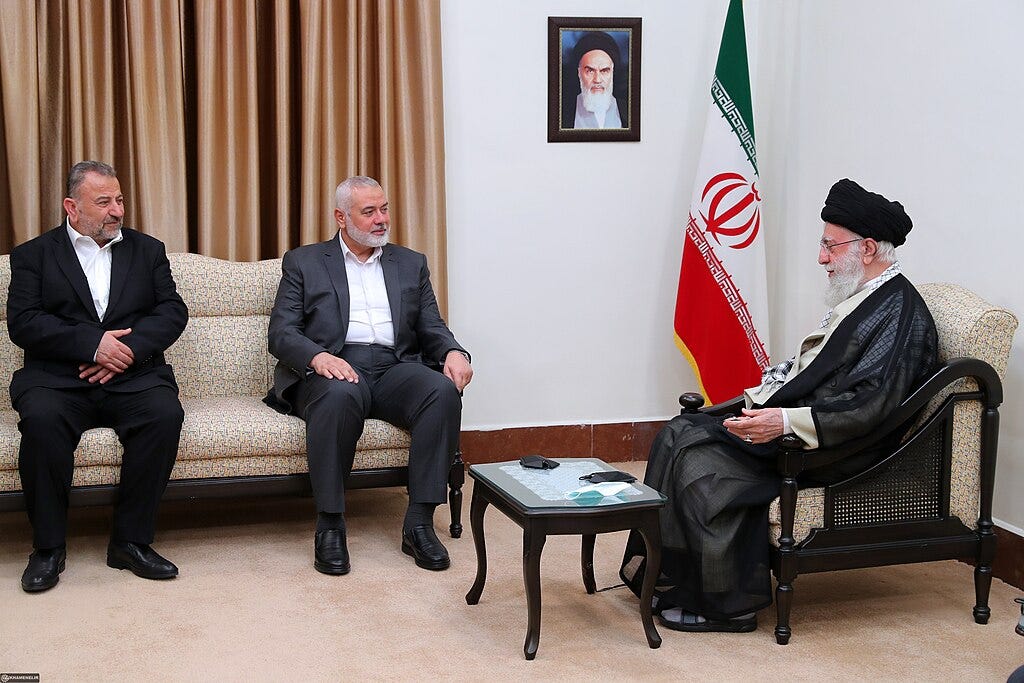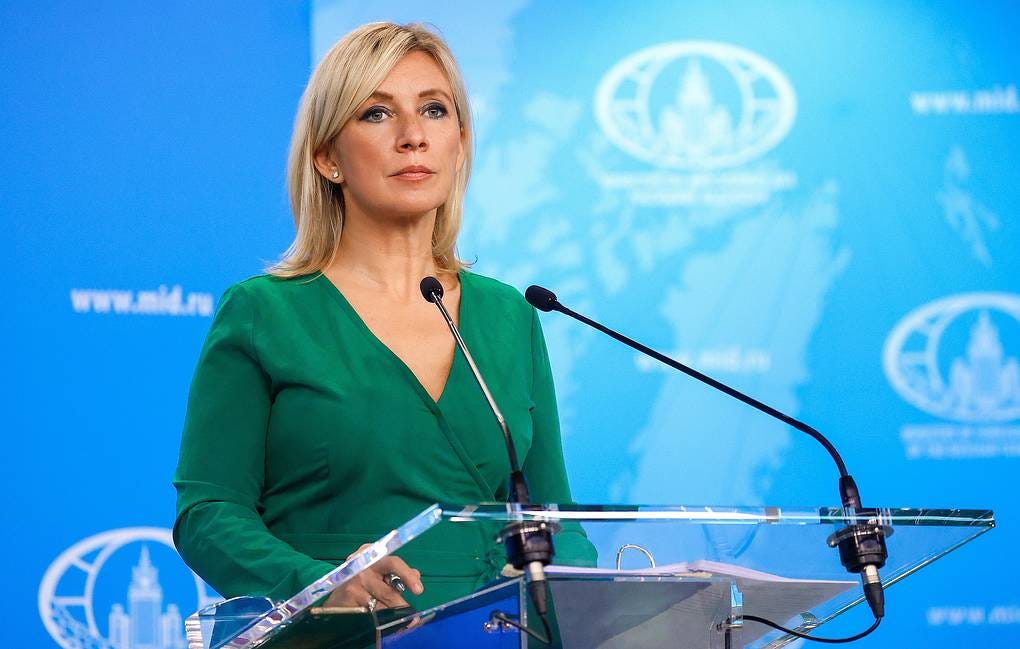“If anyone slaps you on the right cheek, turn to them the other cheek also,” seems to be a major driver of Russian and Iranian foreign policy. Although Moscow and Tehran suffer humiliation on a daily basis in the international arena, they refuse to raise the stakes, escalate tensions, or seriously respond to their opponents’ actions.
Nominally, the two countries are not allies, nor have they signed a treaty on comprehensive strategic partnership yet. In reality, however, Iran helps Russia’s war efforts in Ukraine by providing Moscow with drones and ballistic missiles. The Kremlin, on the other hand, has still not delivered any Su-35 Flanker fighter jets to the Islamic Republic, as it continues to act as a de facto ally of Israel.
Following the Israeli killing of Hamas’ top political leader Ismail Haniyeh in Tehran on July 31, Russian President Vladimir Putin asked Iran’s Supreme leader Ayatollah Ali Khamenei for a “restrained response.” Politically and militarily, it is Russia that would be the main beneficiary of a potential escalation of the conflict in the Middle East. A large-scale war between Iran and Israel would mean that the United States and its allies would need to arm both Israel and Ukraine simultaneously, which could be easier said than done.

But Putin is reportedly worried about “the fate of Israeli civilians”, which is why he sent his ally Sergei Shoigu to Tehran to urge the Iranian leadership not to take too harsh an approach regarding the Jewish State. Back in April – following the Israeli strike in Damascus, which killed seven officers of the Iranian Islamic Revolutionary Guard Corps (IRGC), including two generals – former Russian President Dmitry Medvedev said that “America does not want a big war in the Middle East.” Putin’s approach, therefore, seems to align with Washington’s interests in the region.
His “restrained response” to the Ukrainian offensive in Russia’s Kursk region appears to be the strategy that Iran is using vis-à-vis Israel. As Ukrainian President Volodymyr Zelensky stressed, Putin’s “zero reaction” to Kiev’s actions in Kursk has proved that “there is no single rational reason to deny Ukraine true power, true long-range capabilities.” From an Israeli perspective, the fact that Iran – almost one month after Israel killed Hamas leader – did not respond to the Jewish State’s action, proves that “there is no single rational reason” not to continue targeting Iranian leaders and proxies, or attacking the Islamic Republic’s assets throughout the region.

In international relations, the policy of “turning the other cheek” is always seen as a sign of weakness. As Putin said in 2004, following the Beslan school siege, the weak get beaten. Thus, Israel as Iran’s arch-enemy, and Ukraine as Russia’s major opponent, undoubtedly interpret Tehran’s and the Kremlin’s passivity as a clear demonstration of political impotence.
Russia and Iran even use the same rhetoric every time they suffer a humiliation on the global stage. “Russia reserves the right to tough response to Ukraine’s attacks” is a standard Kremlin’s mantra. In reality, Moscow’s response is always weak. Two and a half years after Russia launched the full-scale invasion of Ukraine, the Russian military (despite numerous threats) has not even attempted to bomb the so-called decision-making-centers in Kiev in response to Ukrainian strikes on Russian territory. Instead, Russia occasionally bombs civilian energy infrastructure in Ukraine, although not in a way to completely destroy the Eastern European country’s energy system.
Eventually, Russia might really target the-so-called decision-making centers (in reality, empty administrative buildings), while Ukraine will likely seek to destroy the Crimean Bridge – a move that will represent yet another humiliation for the Kremlin.
Iran’s approach regarding Israel seems to be even weaker than Moscow’s reaction to Ukrainian attacks on the Russian Federation. The Islamic Republic issues Kremlin-style threats to Israel, although it hesitates to take any concrete measures against its arch-enemy.
“Iran reserves its inherent and legitimate right to respond legitimately to the crime of the Zionist regime,” Iran’s Acting Foreign Minister Ali Baghri Kani said on August 17.
In April, Iran launched hundreds of drones and missiles at Israel in response to the Israeli strike in Damascus. But the Iranian attack did not cause any damage to the Jewish State. Tehran’s goal was likely to “respond” to Israel in such a way that would avoid a blow to its strategic nuclear facilities. As a result, its “strike” on Israel was generally interpreted in Western media as a demonstrative action planned to minimize real harm to the Islamic Republic’s opponent.
More importantly, Iran not only warned the United States and countries in the region about the attack in advance, but it also launched drones from its territory, rather than from northern Lebanon or Syria. Iranian drones and missiles flew for several hours, which took away any element of surprise from the attack.
Israel is now waiting for Iran to “respond” to the assassination of Hamas leader, although its policy makers almost certainly know that Tehran will not dare to raise the stakes this time either. While waiting, the Jewish State continues killing Iranian proxies in the region. According to reports, on August 19, Israeli military killed a top Hezbollah commander in southern Lebanon. Previously, on July 30, the Israel Defense Forces eliminated Hezbollah “most senior military commander” Fu’ad Shukr.
The Tehran-backed group used harsh Russian and Iranian-style rhetoric, but to this day it has not responded to Israeli action. According to Iran’s Revolutionary Guards Corps (IRGC) spokesperson Alimohammad Naini, the waiting period for Iran’s retaliation against Israel could be long. Since Hezbollah is not an autonomous actor in the Middle East, but the IRGC’s proxy, the group is unlikely to take any action against Israel until it gets the green light from Tehran.
The Kremlin – suffering a humiliating defeat in Kursk – seems to be using the same strategy as Iran. Moscow prepares the Russian population for a “new normal” in which Ukraine will control parts of Russia’s Kursk region “for a long time.”
Western-backed Ukraine and Israel undoubtedly benefit from Moscow’s and Tehran’s policy of endless waiting and half-measures, as it allows them to achieve at least some of their long-term geopolitical goals. The biggest losers in this game appear to be the Russian and Iranian people, the vast majority of whom outwardly tolerate their regimes while harboring deep-seated disdain for them.
Nikola Mikovic is a freelance journalist, researcher and analyst based in Serbia. He covers mostly the foreign policies of Russia, Belarus and Ukraine, as well as energy-related issues. Nikola primarily focuses on Russia’s involvement in post-Soviet space, the Middle East, and the Balkans. He writes for several publications such as Byline Times, CGTN, Lowy Institute, Geopolitics & Empire, Global Comment, and World Geostratregic Insights, among others.







Here is an idea that I don't think is discussed enough:
BOTH sides (Iran/Russia Vs Israel & the collective 'west') are controlled by the SAME masters.
I think this is a more feasible explanation than one side just talking a tough game but actually being quite weak and unable to deliver on those threats.
https://substack.com/@michaelginsburg/note/c-54443985
I suggest people look up pictures of the current Iranian Parliament and the building of the Israeli supreme court.
If you've never done that, prepare to have your mind blown!
https://actionabletruth.substack.com/i/139437755/the-bigger-picture
The basic premise everyone should start any process of logical deduction from is that we live in a world that no longer has ANY coincidences...EVER. Maybe it never had them.
Interesting, so what's up with the talk that Iran is going to assassinate Trump? Is Iran also the scapegoat for the deep state? Or is that just a plot to remove them from being a threat to Israel?